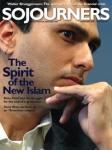On Jan. 20, the United States of America inaugurates its first African-American president and first Catholic vice president. As a nation—and as an ideal—America has reached a watershed point, a kairos moment.
Barack Obama’s election symbolizes a resurgence of what some theologians call a “passion for the possible.” It’s essentially a spiritual experience—even if those to whom it’s happening don’t understand it in those terms. The church calls it “hope.”
However, genuine hope often incites a backlash. If we take seriously Paul’s description of the fallen “principalities and powers” (Ephesians 6), then palpable, prophetic, authentic hope will provoke a response from “the spiritual forces of wickedness,” evil, or “the Unspeakable,” as Trappist monk Thomas Merton phrased it.
In a groundbreaking 2008 book, JFK and the Unspeakable: Why He Died and Why It Matters, Catholic theologian and nonviolence leader Jim Douglass probes the role of the principalities and powers in the assassination of John Kennedy, the first Catholic president. JFK is the story of how President Kennedy nearly started a nuclear war, then turned toward peace with the enemy who almost started it with him—and why that turning got him murdered. It’s an old story of prophets, kings, and consequences.
Douglass’ years of meticulous scholarship, including fresh interviews and access to White House memos only released in the mid-1990s, prompted Gaeton Fonzi, former staff investigator for the U.S. House Select Committee on Assassinations, to write that JFK and the Unspeakable is “by far the most important book yet written on the subject.” Douglass tells the story that, until now, America has not had ears to hear.
While the historical truth is crucial, even more important is Douglass’ dissection of the spiritual mechanics of hope and evil operating during the 1950s and ’60s in domestic and international politics. Kennedy, he posits, began as a Cold Warrior committed to Pax Americana secured through superior nuclear military might. But the near cataclysmic disaster of the Cuban Missile Crisis and the isolation Kennedy experienced from his own military advisers forced him to reach out for help—both publicly and in secret back-channel memos—to his greatest enemy: Soviet leader Nikita Khrushchev.
Kennedy had what Christians call a conversion. He turned toward peace. This conversion locked him into a death spiral with the military and security establishment that was fanatically committed to, as Gen. Curtis E. LeMay put it, “Pax Atomica,” the threat of annihilation of America’s enemies through nuclear war.
Kennedy showcased his new vision in June 1963 during a speech at American University in Washington, D.C., by preaching on the absolute necessity for nations to choose peace. “What kind of peace do I mean?” asked Kennedy. “Not a Pax Americana enforced on the world by American weapons of war. Not the peace of the grave or the security of the slave. I am talking about genuine peace, the kind of peace that makes life on earth worth living … .”
It was this speech, Douglass says, that prompted the Unspeakable—in the form of people within the U.S. intelligence and military structure—to act.
FAST-FORWARD TO Jan. 28, 2008, when Ted and Caroline Kennedy stood on the stage at American University to endorse Barack Obama for president. President Kennedy’s 1963 speech formed the historical backdrop. The Kennedys, I think, were sending a message: Barack Obama can pick up the banner for peace dropped by John Kennedy in death.
I also read another message. If Obama genuinely pursues the dream that he campaigned on, it will force him into a spiral of conflict with the Unspeakable. The Unspeakable will try to isolate him and will lure him into military traps in Afghanistan, Iran, or Syria, which are setups for failure. It will discredit and humiliate him. Doubt, distrust, and equivocation will spring up around him. If he accepts the call to a prophetic presidency, history will attempt to repeat itself.
It’s only by knowing the story of prophets and kings that people of faith can recognize the historical moment and act appropriately. “Christian hope,” writes Thomas Merton, “begins where every other hope stands frozen stiff before the face of the Unspeakable.”
It is up to us to be out in front of this president, morally and politically. If we publicly proclaim the vision we expect him to pursue, it will be easier for him to pursue it. If we push back when he acts out in fear, if we demand the truth when disturbing rumors start to fly, we can offer Barack Obama spiritual (and some political) protection. We must do our part to push forward the dream, as John Kennedy said, “to build a world of peace where the weak are safe and the strong are just.”
Rose Marie Berger, an associate editor of Sojourners, is a Catholic peace activist and poet and the author of the forthcoming book Who Killed Donte Manning?

Got something to say about what you're reading? We value your feedback!